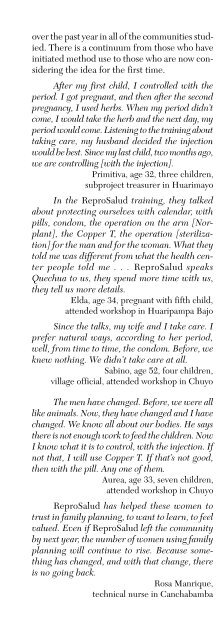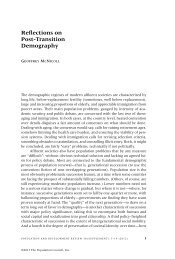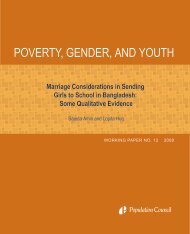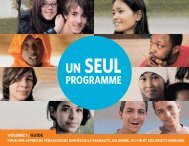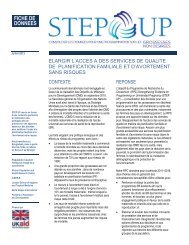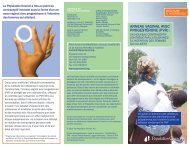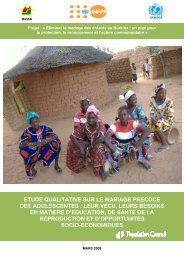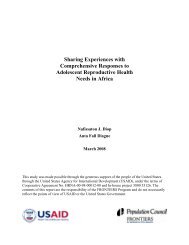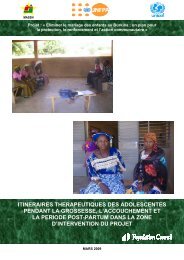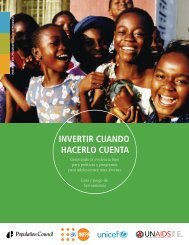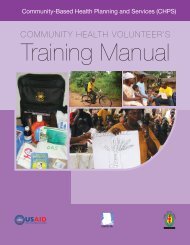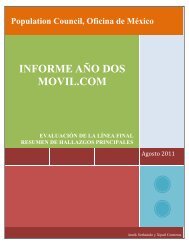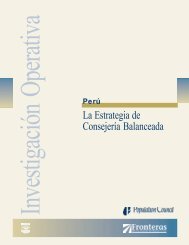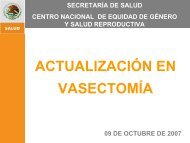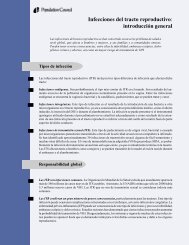QCQ# 10 Alone You are Nobody, Together We Float: The Manuela ...
QCQ# 10 Alone You are Nobody, Together We Float: The Manuela ...
QCQ# 10 Alone You are Nobody, Together We Float: The Manuela ...
You also want an ePaper? Increase the reach of your titles
YUMPU automatically turns print PDFs into web optimized ePapers that Google loves.
over the past year in all of the communities studied.<br />
<strong>The</strong>re is a continuum from those who have<br />
initiated method use to those who <strong>are</strong> now considering<br />
the idea for the first time.<br />
After my first child, I controlled with the<br />
period. I got pregnant, and then after the second<br />
pregnancy, I used herbs. When my period didn’t<br />
come, I would take the herb and the next day, my<br />
period would come. Listening to the training about<br />
taking c<strong>are</strong>, my husband decided the injection<br />
would be best. Since my last child, two months ago,<br />
we <strong>are</strong> controlling [with the injection].<br />
Primitiva, age 32, three children,<br />
subproject treasurer in Huarimayo<br />
In the ReproSalud training, they talked<br />
about protecting ourselves with calendar, with<br />
pills, condom, the operation on the arm [Norplant],<br />
the Copper T, the operation [sterilization]<br />
for the man and for the woman. What they<br />
told me was different from what the health center<br />
people told me . . . ReproSalud speaks<br />
Quechua to us, they spend more time with us,<br />
they tell us more details.<br />
Elda, age 34, pregnant with fifth child,<br />
attended workshop in Huaripampa Bajo<br />
Since the talks, my wife and I take c<strong>are</strong>. I<br />
prefer natural ways, according to her period,<br />
well, from time to time, the condom. Before, we<br />
knew nothing. <strong>We</strong> didn’t take c<strong>are</strong> at all.<br />
Sabino, age 52, four children,<br />
village official, attended workshop in Chuyo<br />
<strong>The</strong> men have changed. Before, we were all<br />
like animals. Now, they have changed and I have<br />
changed. <strong>We</strong> know all about our bodies. He says<br />
there is not enough work to feed the children. Now<br />
I know what it is to control, with the injection. If<br />
not that, I will use Copper T. If that’s not good,<br />
then with the pill. Any one of them.<br />
Aurea, age 33, seven children,<br />
attended workshop in Chuyo<br />
ReproSalud has helped these women to<br />
trust in family planning, to want to learn, to feel<br />
valued. Even if ReproSalud left the community<br />
by next year, the number of women using family<br />
planning will continue to rise. Because something<br />
has changed, and with that change, there<br />
is no going back.<br />
Rosa Manrique,<br />
technical nurse in Canchabamba<br />
<strong>The</strong> lessons learned from the case study<br />
closely parallel those that emerged from a<br />
multicountry evaluation, by the Global Fund for<br />
Women, of efforts to promote empowerment<br />
and family planning among women’s organizations.<br />
That evaluation also found that women<br />
tended to see building self-worth and confidence<br />
as prerequisites to effecting changes in family<br />
and community life, and that participation in<br />
women’s organizations promotes such individual<br />
growth. <strong>The</strong> authors of that evaluation argue<br />
that, in neglecting these personal markers, development<br />
experts fail to understand the complex<br />
processes by which women and their organizations<br />
can effect positive change.<br />
<strong>The</strong>se findings join a growing body of literature<br />
that is overthrowing the conventional<br />
wisdom that it is folly to tinker with deeply ingrained<br />
intangibles such as gender dynamics and<br />
self-worth. Heightened self-esteem and an expanded<br />
sense of what is possible <strong>are</strong> now the<br />
signature of the women—and men—whose lives<br />
have been touched by ReproSalud.<br />
QUANTITATIVE FINDINGS<br />
Early quantitative data were generated<br />
from pre- and posttests among a sample of participants<br />
in the community workshops. Responses<br />
showed increased knowledge of how<br />
methods work and striking increases in knowledge<br />
of the fertile phase of the menstrual cycle<br />
(from 29 percent to 50 percent); recent experience<br />
discussing family planning (from 60 percent<br />
to 98 percent); and stated intention to begin<br />
using a method within the next year (from<br />
40 percent to 68 percent).<br />
At the time of the case study—eight months<br />
to one year after the workshops—studies were<br />
undertaken to measure impact on service utilization.<br />
Analyses of patient logs at family planning<br />
service sites, generated by comparing the logs<br />
from a two-month period before ReproSalud<br />
began working in the <strong>are</strong>a to the same two-month<br />
period a year later, corroborated the qualitative<br />
findings. While the patient logs were not of the<br />
best quality and absolute numbers remain small,<br />
dramatic increases in utilization of contraceptive<br />
services were documented among residents of the<br />
villages where ReproSalud is working. At one hospital,<br />
there was a 400 percent increase in family<br />
23


